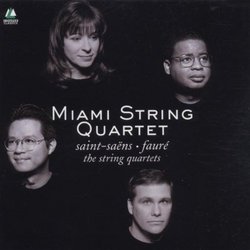Miamis Win the Super Bowl
B. Hawk | Los Angeles, CA | 02/05/2000
(5 out of 5 stars)
"This is a luminous recording! I typically shy away from chamber music (with the exceptions of The Kronos Quartet and the Emerson String Quartet) finding it less dynamic and emotionally compelling than orchestral works, but this album rates as one of my favorite classical recordings. The musicians show incredible skill and soulfulness as individuals yet combine their virtuosity into an ensemble performance that is truly transcendent."
LATE QUARTETS
DAVID BRYSON | Glossop Derbyshire England | 05/21/2010
(5 out of 5 stars)
"Saint-Saens and Faure wrote no early quartets, nor any middle-period quartets either. They were both long-lived, and they came to the quartet medium only at an age that Beethoven never attained. There are two examples from Saint-Saens, written in his 60's and his 80's respectively (and in the keys respectively of E minor and G major, information that is oddly withheld), and Faure's solitary production was completed only in the last months of his life.
One of the things that I like best about this excellent and enterprising disc is finding that it does not require French musicians to perform this very French music. The Miami Quartet are new to me, and I hope to get to know them better before long. The works are not exactly pieces that I could have sung, hummed or whistled on request either, but this set is motivating me to get to know them also much better. They reward the effort I'd say, and while probably everyone would expect that when it comes to Faure, I find to my own surprise that it's the Saint-Saens numbers that are chiefly engaging my interest at this stage. Faure said that Saint-Saens feared the string quartet medium and that he `did not succeed' with it. I wonder what the French was, but if it was `n'a pas reussi' that would suggest that the meaning is that Saint-Saens did not achieve the popular success that he was accustomed to. I can't believe that disparagement of the quartets as music was intended. Indeed I find the first quartet a serious and deep composition, suggestive of no less that Beethoven's late quartets, particularly the B flat. Saint-Saens was used to audiences and applause, and he must have known that string quartets were not a route to those. He specialised in easy charm, and although he reverts to that to some extent in the second quartet, in the first it seems to me that he decided to go serioso and be damned.
Anyhow, that is how the Miami Quartet put these works over to us, and I'm completely convinced. When it comes to Faure, the tone has to be modified to some extent. This is very late Faure indeed, and long before now his idiom had evolved into an understated mandarin style, uniquely subtle in harmony and smoothing out the traditional clear separation of distinct themes Beethoven-style. These players seem to me to have the idea just about right. When I listen to Amoyal and Roge performing Faure's violin sonatas I can easily be tempted to think `how French all this is'. Music is music is music, I now reflect, and given the required sensibility and intelligence from the performers, music can take part in globalisation along with so much else.
The liner note mentions the possibility that the lateness of these compositions was due to awe of Beethoven. This particular liner note is remarkable for its avoidance of any firm viewpoints, but in this particular instance I have no clear opinion either. Composers who did not much want to write, say, string quartets or piano sonatas, could always say that they dreaded to walk in Beethoven's shadow, and if they didn't say it themselves there are any number of routine commentators standing ready to say it for them. Awesome Beethoven surely was, but that did not deter Schumann, Mendelssohn, Brahms, Smetana, Dvorak, Tchaikovsky and Borodin from turning out quartets to their own stylistic ideas.
If you are looking for clear guidance regarding this music, this liner note is not where you will find it. It is informative up to a point, but I also found it exasperatingly feeble-minded and tentative. `Was it the daunting shadow of Beethoven...[etc etc]' it begins. I don't know: tell me. `The listener may decide for himself' we read elsewhere. Too kind, too kind. `Was Faure more successful...?' it concludes. Maybe he was and maybe he wasn't, I guess. Get off the fence for heavens sake. There is also some technical information about the Extended Dynamic Range used in the recording. This is a matter of 20-bit analogue to digital converters, and while I have no complaint whatsoever about the recorded sound I couldn't say honestly and truly that it seems better than many another excellent piece of recent engineering that I have been privileged to hear. The other privilege here is the music and the way the music is performed for us. Perhaps you will be honorary Californians and share the experience with me."


 Track Listings (10) - Disc #1
Track Listings (10) - Disc #1